The Santa Ana winds raise dust clouds as I drive up the Pacific Coast Highway to Malibu in a car hastily borrowed from my friend Tom, who responded with alacrity to my alarm that my Pierce Brosnan interview had been changed from the Irish DreamTime office in the MGM building, ten minutes from my hotel in Santa Monica, to Coogie’s coffee shop in Malibu.
The beauty of the California coastline in the early morning sun has a surreal, but tranquilizing effect, somewhat quelling my anxiety that my poor sense of direction will keep me from my 10 a.m. meeting with “the sexiest man on earth.” (People magazine, 2001).
With palm trees stirring in the breeze and the sparkling ocean to my left I can’t help but reflect on the distance from here to Ireland, the extraordinary road that Brosnan has traveled and the “Hollywood” ending that he has by talent and chance played out for himself.
The Ireland of his childhood couldn’t be more different from the affluence of Malibu where he now makes his home. Brosnan grew up in the small town of Navan, on the River Boyne cared for by his grandparents and his aunt while his mother worked in England. His father Tommy had “headed for the hills” when he was still an infant.
Once at Coogie’s, which is like any coffee shop in any mall except for its clientele, I switch tables several times trying to find a spot that has the least amount of noise, and wait. But not for long. Brosnan is right on time. A handsome six-foot-one, with dark hair, sea-blue eyes, and a natural sense of grace and elegance, it’s possible that Brosnan is even better looking in person than he is on screen. The suaveness of James Bond is not so apparent in the morning stubble and blue windbreaker. And his smile reveals slightly crooked bottom teeth, which only add to his boyish charm.
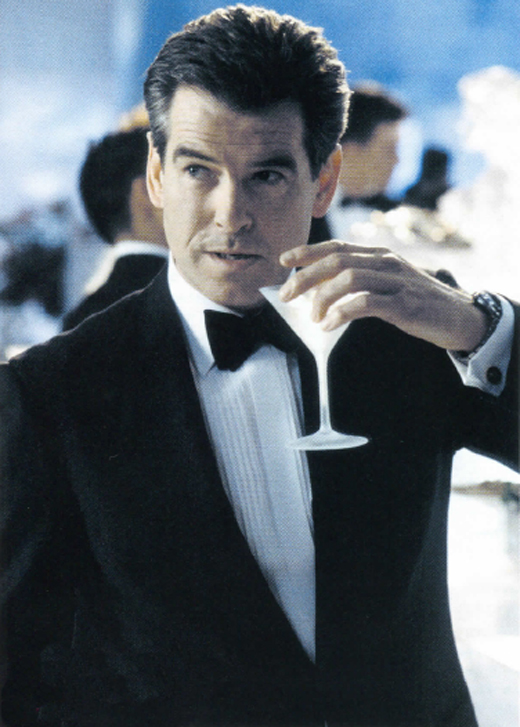
He decides that the other side of the room would be better. We move. He orders chamomile tea. I have a big glass of water. It’s early days of the War on Iraq and he says a few mumbled words, which I don’t catch, on the war being difficult to comprehend, but better than waiting for it to happen, and “you know it’s a bright blue day down here in Malibu.”
Interesting in a bizarre way is the fact, as I later discover, that the British Army are using the titles to James Bond movies for their Operation code names in Iraq (Operation James, Operation Goldfinger, Operation Pussy Galore). Perhaps not so bizarre when you consider that Ian Fleming, the creator of James Bond, worked for British Intelligence during World War II.
But Brosnan is not here to talk about James Bond. He’s here to talk about Evelyn. The latest movie from his Irish DreamTime production company is based on the true story of Desmond Doyle, a working class Dublin man, and his fight for the return of his three children who were taken by the state when his wife abandoned the family. Set in 1953, and starring Brosnan as Doyle and Aidan Quinn as the Irish-American lawyer who decides to help him, it’s a moving drama, rife with humor and romance. Julianna Margulies, who grew up in England, manages a good Irish accent and gives a credible performance as Bernadette Beattie, a freethinking Irish woman, whom Doyle enlists to help. Veteran actors Alan Bates and Stephen Rae also have substantial roles. The young actress Sophie Vavasseur is particularly good as Doyle’s daughter Evelyn. In real life it was the grown-up Evelyn, now living in Scotland, who actively tried to get the story out and sought help from screenwriter Paul Pender, who took the story to Brosnan.
“I just thought it was a very good read and when I got to the end I wanted to read it again,” Brosnan says. “It was based on truth and when I began to really look at the man and what he did, and how the picture was drawn, it had a simplicity of storytelling to it.”
Much has been made of Brosnan’s own family background and if it influenced his decision to make the movie. “It had a resonance with my own life. How could it not?” he says. “Old Tommy went out into them there hills when I was just an infant.” He declines to talk any further about his father whom he refers to as “the old man” who was from Tralee, Co. Kerry I mention that I’d heard that the two had had a reconciliation in 1986. “Oh yeah, well, you are not going to go into all that – we’re here to talk about the movie – good woman.
“I have forgiven all of that, said all of that,” he continues after a pause. “I made the big mistake of coming to America 20 years ago and opening my big fat mouth. You know it’s that Irish confessional thing of yapping away and you think you’re just yapping away and the next thing is your whole life story comes around 20 years later to smack you in the face.”
“But [Evelyn] has many emblems of my own life,” he admits. “It’s set in the fifties. I was born in fifty-three. But it’s not about my life. It’s about Desmond Doyle, who is a romantic, a hero from the ghetto in Dublin who dared to step outside the box – a painter and decorator, who went against the odds and battled church and state and won.”
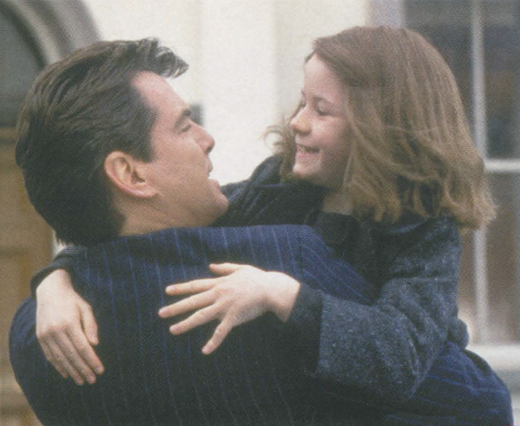
With regard to the recent spate of scandals within the church, Brosnan thinks that it’s very good that it’s all coming out. “How can something like that just be buried and buried? It makes for a very mangled people – or it can do. The lucky ones can find a path out of that place [through] good therapy, good counseling or whatever you call it. But the film isn’t about that. It doesn’t really deal with it in a very heavy way and I thought that was good. We’ve all seen gloomy films with a ‘message,’ but this is different. It’s a very hopeful film, very optimistic about the future and the good that people can do when they set their mind to it.”
He admits that as a child growing up in Ireland he didn’t feel he had any rights. “I certainly didn’t feel like I had any control. The Christian Brothers, and one end of the baton, the big book and the mighty words of heaven and hell and purgatory and sinning and shaming and all the rest.” However, he does remember that in the “days of his own innocence” the church was a wonderful experience. “Serving mass – the whole theatricality of it – was probably the first seeds of being on stage and doing something for the first time that I felt I was rather good at. Yeah, it had that operatic quality about it. Especially in Navan, which has quite a beautiful church – gorgeous stations of the cross, and fantastic paintings of the apostles – really great pieces of art.”
At age 11, Brosnan joined his mother in England. It was a difficult transition. In school he was singled out for being Irish. “There certainly were fights. That first year it was either sink or swim, so you start swimming or you start fighting because they just want to get to you. They could never get their tongues around the name Pierce Brosnan or they didn’t want to, so I was known as ‘Irish.’ And I thought okay I’m very proud of that. You think you are trying to mock me with that word, but I’m so proud of that.”
Upon reflection, Brosnan says that it was a good experience in that it made him really resilient. “You learn to act fast, you learn to act tough, even though you don’t know how to be tough. You learn how to fight. And you learn humor. You learn how to deflect with humor so you don’t have to end up getting in a fight. You learn how to stay ahead of them.
“I’ve never really articulated it well in interviews.” He trails off as if wondering if his words will end up in tabloid headlines “Brosnan Bashes British Schools.”
But he brightens instantly again having summoned up a more pleasant memory. As in every James Bond movie – there was a girl.
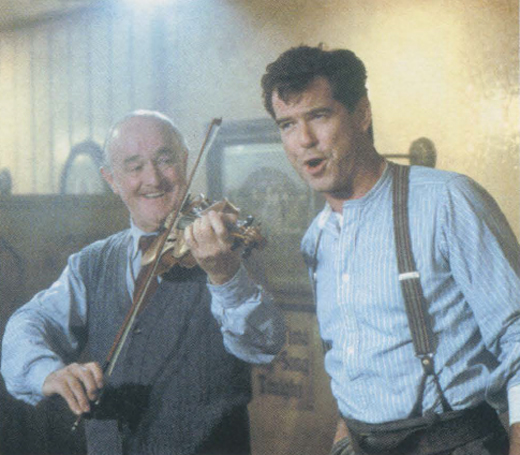
“There was a beautiful American girl. She came in like a little princess at the end of the first year. Her name was Robin. I can remember seeing her and sensing that she too felt like an outsider. I was only 11 and an innocent 11 at that, but it was like, there’s someone I can identify with in more ways than one.
Brosnan left school at 15 and trained as a fire-eater with the circus. Later he found work as a commercial artist, drawing illustrations for the British retail trade. One night a friend introduced him to the Oval House Theatre Club in London, and he had an epiphany.
He remembers it vividly. “The night I walked through the doors of the Oval House was a great baptism of the mind and heart relaxing into this kind of beautiful bath of the arts where anything is possible.
“There were poets, writers, actors and directors. The Black Panthers held their meetings there and I would sometimes do the spotlights for them. And seeing black people get their shit together, especially having come from Ireland to England, and having come from a comprehensive system where you really had to fight; and your guard was always up, made me realize how Irish I was.”
Brosnan went on to study acting at the Drama Centre in London for three years. Success came relatively quickly. Tennessee Williams recruited him for a London production of his play The Red Devil Battery Sign. Italian director Franco Zeffirelli offered him a role in another high-profile production, and by the late 1970s he was picking up guest appearances in prestigious British television shows.
It was only a matter of time before America came calling.
In 1980, he was cast as Rory O’Manion, the male lead in The Manions of America, a television series which used the Irish Famine and emigration as a backdrop. In a 1997 interview with Irish America, Brosnan told Colin Lacey, “When I got off the plane in America, I felt the greatest I ever had in my life. I remember leaving Heathrow in London on Aer Lingus with a copy of The Great Hunger by Cecil Woodham-Smith under one arm and the script for The Manions of America under the other and feeling this great, great surge of emotion as we lifted off the runway. I thought, by God I’ve done it. It’s my time and I’m gonna take it by the throat and fly with it. Because it was my time to take the anger and the shame of the playground and put it on film and perform it in a piece about what had been done to Ireland by the English back then.”
The Manions “a bit of a soap, but a lot of it was good, strong stuff” was a success. Brosnan was happy. He married the Australian actress and former Bond girl Cassandra Harris, who had two children by former partner Dermot Harris, a brother of actor Richard. NBC cast him in the role of Remington Steele, and Brosnan became a household name. People magazine called him “the new Cary Grant.” After four seasons, however, ratings started to slip and Remington Steele was canceled.
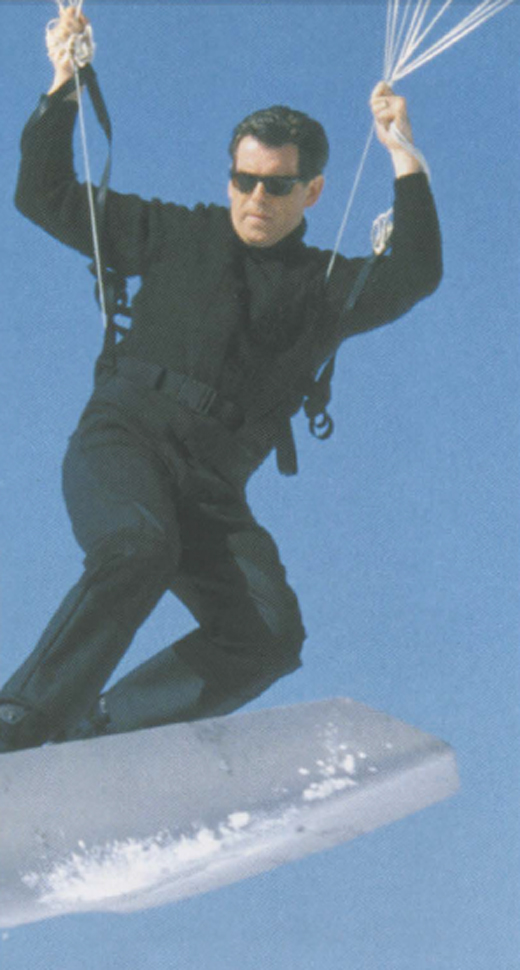
Rumors began to fly that the producers of James Bond were looking to replace Roger Moore and Brosnan was being touted in the press as the possible successor. But in a cruel irony, media interest in the possibility of Brosnan landing the role brought new attention to Remington Steele. Summer reruns of the show reached the Nielsen Top 5 for the first time ever and the producers decided to hang on for another season. The Bond role was offered to Brosnan but NBC wouldn’t release him from his contract, and Australian Timothy Dalton became the next 007.
Brosnan was crushed. However, there was a greater tragedy in store for the actor. Cassandra was diagnosed with ovarian cancer and died on December 28, 1991, one day after the couple’s eleventh wedding anniversary. Devastated, Brosnan continued to work to raise Charlotte and Christopher, Cassandra’s children, who took Brosnan’s name early in the couple’s relationship, and a third child, Sean William, born in 1983. To help combat his grief he became active in a number of charities involved in the fight against cancer. It’s a cause that is still close to his heart.
“I’ve always been tied to that and I always will be because I have family. I watched someone wonderful and great and beautiful fade away to the disease. So I help wherever I can,” he says.
In 1994, as he was preparing to begin filming a new version of Robinson Crusoe, longtime Bond producer Cubby Broccoli offered Brosnan the opportunity he had earlier been forced to forgo. This time, Brosnan was free to accept and he was announced as the fifth James Bond.
“It was destiny. It was fate. It was dreaming. It was wanting. I have my own kind of quiet understanding of it,” he says of the fact that the opportunity came around again.
Brosnan was a huge success as 007. Goldeneye was the most successful Bond film in history earning an incredible $350 million. Tomorrow Never Dies and The World Is Not Enough followed, bringing in more than a $1 billion. And when it opened in Japan last March, the latest Bond movie, Die Another Day, brought in a record $3.4 million in one weekend!
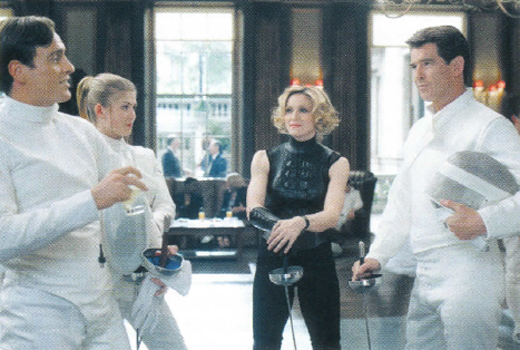
The actor also met and fell in love with Keely Shaye-Smith, a journalist who, like Brosnan, is a committed environmentalist. “To have love once is mighty but to have it twice is even more mighty. To have family again [the couple have two sons] and to have that love in your life is just magnificent and with all of that, you know Keely is someone who is a passionate, intelligent woman who is an environmentalist [they met at a Save the Grey Whale fundraiser]. So the work in the last nine years has been very rewarding and challenging.”
The couple planned to marry in the spring of 2000 but Brosnan’s son Sean William was badly injured in a car accident and the wedding was postponed while he recovered. It took place in August 2001.
“Once we hit on the idea, it was as plain as the nose on the end of my face,” Brosnan says of the couple’s decision to get married in Ireland. “Malibu didn’t make sense. It’s just a million miles from anywhere and then England didn’t quite make sense because I’m Irish [laughs] so it had to be Ireland. When we first met, and I think it goes back to that – the initial blush when you fall in love – I took Keely to Ireland. That was after Goldeneye and I had this hankering to go back to Ireland for some reason.”
The committed environmentalists found that the booming economy has, sadly, left its mark on the Irish landscape. “The land is disappearing, it’s going fast, that’s the sadness,” Brosnan says regretfully. “It’s a small land, a tiny, tiny piece of land. I noticed when we went over for the wedding – from the helicopter, you could see all the houses, and the great gouges in the quarries, the gaps in the sides of the mountains. I was shocked,” he recalls.
Environmental worries aside, the wedding was a huge splash, with exclusive photo rights sold to Hello magazine and security worthy of James Bond. The ceremony took place in Ballintubber Abbey on August 4, 2001, where Paris Beckett, Brosnan and Keely’s second son, then four months old, was baptized the day before. The reception was held in Ashford Castle, outside of Cong where the John Wayne classic The Quiet Man (and also an episode of Remington Steele) was filmed.
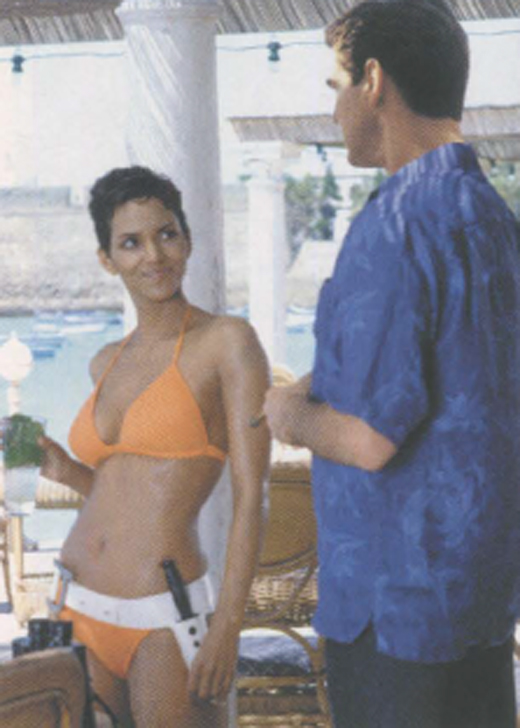
Most important for Brosnan was the attendance of a recovering Sean William whose serious injuries had caused the wedding to be twice postponed.
“He’s in great shape,” Brosnan says of Sean who suffered spinal injuries in the car accident. “That one really pulled the guts out of me and him. Bless his heart [laughs]. He certainly saw the light that night.”
Now living in England, Sean has decided to follow in his father’s footsteps. “He’s in drama school in England and he’s becoming a man of the stage. A man of substance now. It’s lovely to see it because I now find myself living vicariously through him and it’s a delight because he just played Vershmif! in The Three Sisters which I played in my third term and he’s now doing it in his first term. So there’s wonderful joy in kind of reeducating one’s self again, of looking at poetry that he’s studying and so on.”
Brosnan, however, has no plans to return to the stage himself. “I think about it but I don’t do anything about it. No. I dream about it. Imagine it but don’t do anything about it,” be says.
Between Bond movies, Brosnan found time to start a production company, Irish DreamTime, with his friend Beau St. Clair. I wonder, given the company’s title, if Irish DreamTime was founded to help the Irish film industry.
“Oh God no,” he assures me. “I’m not trying to save anything or do anything like that, but it’s just wonderful going to Ireland to make movies. I enjoy it enormously and you know The Nephew was the beginning for us and I said I’m going to go back to Ireland and make movies as often as possible but I’m also going to make movies here in Hollywood.”
The title does have an Irish-American connection, however. “Actually Irish DreamTime was started in this restaurant with John Cally who was then the big man over there at MGM,” Brosnan relates. “When I went there for Goldeneye he said to me, ‘Look, if you ever need anything, or if you ever have any ideas, just let me know.’ So I called Beau St. Clair who is an old friend. She and her boyfriend and I would often meet and have lunch and one Thursday we were down the road at an Italian restaurant and her boyfriend, the silent partner, was saying, ‘You two should get together and do something.’ He was always going on about this and I said, ‘Okay, shut up for just a moment,’ and I went over to the phone box and I put in a quarter and I said, ‘Could I speak to John Cally?’ And I talked to John and I said, ‘Look, I’m sitting here with my partner and we’ve got a few ideas that maybe we could run by you.’ He said, ‘Sure, meet you at Coogie’s next Tuesday morning.’”
Cally also helped with the company name.
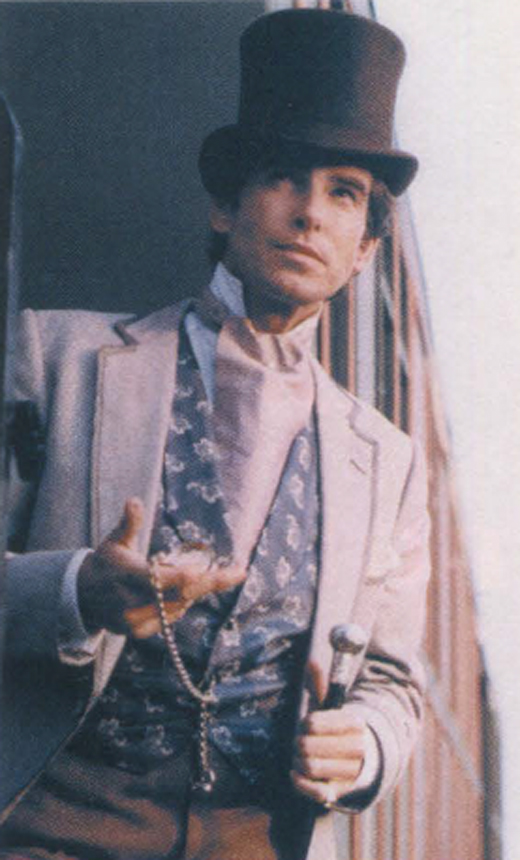
“Every name we chose was taken. Finally I remembered a name I’d used long ago – Dreamtime from the Aborigines of Australia. So John said, “How about Irish DreamTime?’
“So from the meeting here with John Cally we got an office over at MGM and we took the script – The Nephew – from a young Irish writer named Eugene Brady, and we said, ‘Let’s go make it.’ I knew a few people over in Ireland and we set it up in the space of a year and got our toes wet.”
Wet is right. The production was dogged by bad weather. “The weather was awful. But the one day that we really did need decent weather we actually got it. The day I went in the water when the dogs were chasing me, the heavens shone brightly on us, so we got that beautiful vista shot. That’s what you are looking for when you are making a small movie. You are looking for breaks.”
The Nephew is about a black Irish-American returning to Ireland to search out his roots. I ask Brosnan if he thought that might have been a controversial theme. “Well, I think
The Nephew is ultimately about love and about accepting each other, whatever the color of the skin. I don’t know what the percentage of black Irish there are now but we are all brothers one way or the other,” he offers.
The Nephew never made it to the U.S. The big break for Irish DreamTime would be their next production, The Thomas Crown Affair. The remake of the Steve McQueen classic was a huge box office success. The idea came about while Brosnan and Beau St. Clair were working on The Nephew. “We were going into the office each day. That was a new experience,” Brosnan laughs. “Going in, sitting there, thinking now what?” Beau said, ‘What about The Thomas Crown Affair?’ We are both Steve McQueen fans. We both live in Malibu. So I went to Blockbuster that night and rented it. Beau got a copy and came back and said, ‘We could make a love story,’ and so we decided to have a crack at it. And John McTiernan was an old friend, so we sent him a script and he was in. I’m kind of running out of directors now for scripts to do [Laughs].”
When it came time to find a director for Evelyn, his third Irish DreamTime production, Brosnan knew whom he wanted.
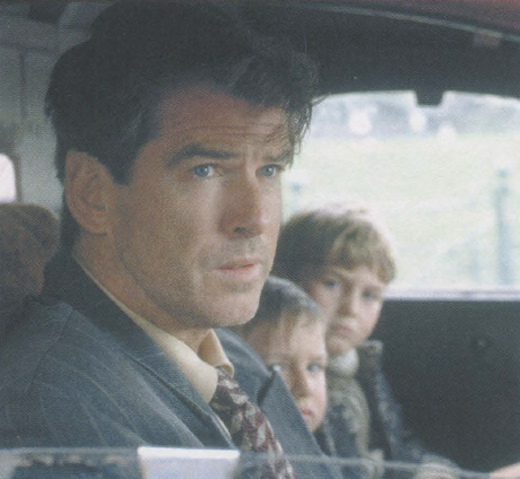
In 1990, at a time Brosnan remembers as “a low point in my life,” Bruce Beresford directed him in Mister Johnson. Set in West Africa in 1923, Brosnan gives a masterful performance as the British administrator Harry Rudbeck whose clerk Johnson (Maynard Eziashi) attempts everything within his power to ingratiate himself into white society.
“He [Beresford] gave me great confidence to do it,” Brosnan says of his performance. “He gave me just the simplicity of being real. He’s very good at creating that ambiance for actors. He has a wonderful way of making it feel like documentary.”
The movie was not a big box office draw, a fact that Brosnan laments. “Twelve people saw it according to him [Beresford]. But it was great to make that movie because it was at a hard time in my life. And I was at the end of the earth doing it. Nigeria, the end of the earth. Living in a tree house.
“Many years later you come bearing gifts, or you hope or think they’re gifts. I said, would you like to make this movie [Evelyn] and he said, ‘Yeah.’”
For his part Beresford says, “Pierce sent me the script and I knew it was something I’d like to make. It’s a touching story about a father trying to get his children back, but the thing I really liked was that it was all done with a lot of humor. So many films about social issues are so heavy, so ‘worthy,’ they’re actually hard to watch.”
The humor aspect also attracted Brosnan to the script, but he admits that Dublin humor is not something that he knew too much about. “It was hard. I was really worried about doing the accent and I’ll probably fall or stand by the accent. But I certainly had a great time playing it. It’s the rhythm of speech with that kind of twang and that snap that it has; you can really get some laughs with your lines.”
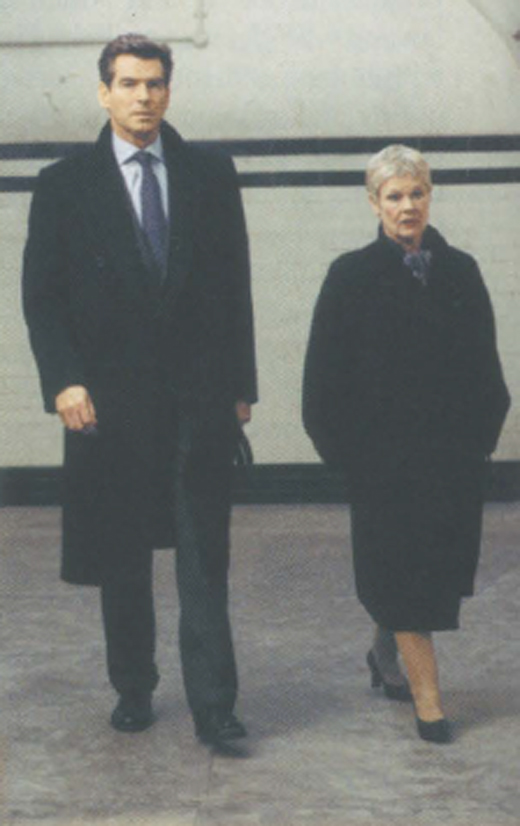
One review of Evelyn mentions that women will find it “a tear-jerker.” I admit to Brosnan that I personally was moved by the story. “It either hits people like that or it doesn’t. I don’t pay too much attention to the notices but I made the mistake of going to the airport in Dublin and they were selling the Evening Herald and I thought ‘let’s have a look at the war’ and there was a most unfavorable review inside. But I’m actually bulletproof with it. I don’t care. If it was something else I probably wouldn’t be, but for some reason I feel at home with the piece. We didn’t set out to be anything more than a romantic old-fashioned, one-man-against-the-odds movie. I think we made a really good film,” he says unapologetically.
Brosnan’s next venture, Laws of Attraction with Julianne Moore, will take him to Ireland again, and though he “loves going back there,” there is a sense that he’d rather stay in Malibu with his wife and two young sons. “The reason for doing this film is because it was written in Los Angeles. It’s about two divorce attorneys and I thought at last I’m home. I can just nip down the road to a location or wherever, but nope. Shoot in New York, go over to Ireland, the glorious tax break. It’s not that easy making pictures these days,” he laments.
In the meantime, Evelyn is set to be released on video, and a CD of the soundtrack featuring Brosnan singing several Irish songs is also on the market. In the movie, as Doyle, he supplements his income by singing Irish ballads in pubs, and Brosnan shows himself to have a fine singing voice. “I loved the singing, loved the singing,” he emphasizes laughing. “There’s a good community of Irish people in Santa Monica, so a couple of the lads came out [to the house] one with a squeeze box, another with a guitar. I never sang before but I just kind of threw myself into it, sitting out there on the beach in Malibu, the old homestead [laughs] it’s not a bad place, the old Guinness there on tap.” He pauses in reflection: “From Navan! Shit, this is grand stuff. I’m still getting away with it. I can’t believe it. I can’t believe it!”
Brosnan looks at his watch and it’s time to go. “I think you’ve got more than enough,” he tells me looking around for the waitress. “I’ll pay the bill,” l offer. And with that he gathers up his copies of Interview, The New Yorker, and two copies of Irish America and before I can say 007 he’s heading out the door. As I walk towards my car he passes me in a silver sports car (sorry, automobile fans, I have no idea what make or model, but very James Bond). He smiles. “Drive carefully,” I offer pathetically. “I will,” he nods. ♦

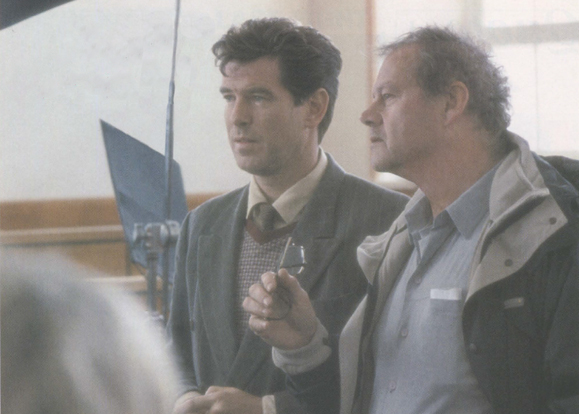
Leave a Reply